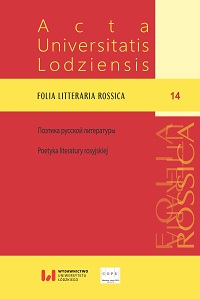Любовь, гендерные роли и стереотипы в рассказах Антона Чехова из народной жизни (Агафья, Бабы)
Love, Gender Roles and Stereotypes in Chekhov’s Stories from Peasants’ Life (“Agafya”, “Baby”)
Author(s): Anatoly SobennikovSubject(s): Literary Texts, Studies of Literature, Russian Literature
Published by: Wydawnictwo Uniwersytetu Łódzkiego
Keywords: love; stereotype; role; peasants; gender psychology
Summary/Abstract: The article is devoted to Chekhov’s stories from the life of peasants and explores how Chekhov described folk ideas about love, how he depicted gender roles and stereotypes prevalent in this environment. The short stories “Agafya” (1886) and “Baby” (“Peasant Wives”) (1891) are interesting from the point of view of describing the state of a woman in love, her role in marriage and her social lot. Chekhov is sensitive to the framework of the folk culture, as reflected in ‘Proverbs and Sayings of the Russian People’ collected by Vladimir Dal. It is marked by male dominance, male aggression, dependent position of a woman, her vulnerability. Young girls shown in “Agafya” and “Peasant Wives” have been married off without love, and female sexuality finds its expression in extramarital relationships. In “Agafya” Savka attracts women with masculine beauty and an artistic manner. His contemplation, “concentrated immobility” and his love for birds are signs of inner freedom: Savka is not like everyone else. His existential choice arouses sympathy in women so that they bring him food or make dates with him at night. In the time of the story, Agafya has been a wife for a year, and the fact that she goes out on a date at night indirectly reflects on her marriage with a railway switchman. She will be punished in the morning. In the short story “Peasant Wives” Mashenka also becomes a victim of male sexuality. When her husband had been conscripted and “packed off to Poland,” a neighbour, Matvey Savvich, began to call on the young woman and to help her with the harder household work. In his own interpretation, “a year had not passed before the Evil One, the enemy of all mankind, confounded me” [from Constance Garnett’s translation]. In Chekhov’s text, the male character does not admit his guilt in seducing another man’s wife; he puts the blame on the woman. Thus, he does not perform the main gender role of a man – to be the protector of his beloved. In Chekhov’s short story there are two gender motives that explain a woman’s love: the first is male help with the household; the second is women’s loneliness, the need for contact and men’s affection. In Matvey Savvich’s description Masha is an adulteress and a criminal. And in all subsequent events – the wife getting bitten by her returned husband, his death from poisoning – Matvey takes the side of the formal justice. Chekhov’s short stories are anti-literary in that they reveal the author’s purpose as depicting peasant and burgher life as actual existence. There is no aestheticisation, heroisation or idealisation of peasant life, which were the sins of the populist writers (narodniki). Chekhov’s Agafya and Mashenka are Russian women, their fates are typical both in terms of gender sociology and of gender psychology. Behind the complex narrative structure, the biographical author (Chekhov) hides his own feeling of pity and compassion for a specific female fate.
Journal: Acta Universitatis Lodziensis. Folia Litteraria Rossica
- Issue Year: 2021
- Issue No: 14
- Page Range: 59-68
- Page Count: 10
- Language: Russian

